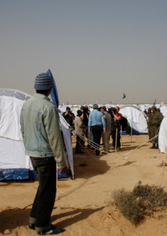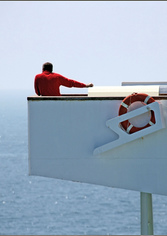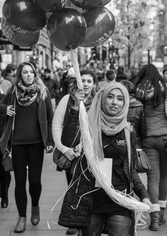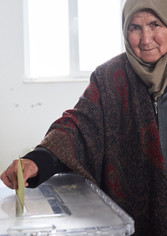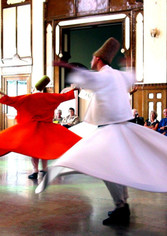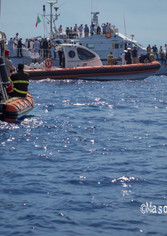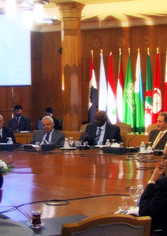Conferences and debates
Index / Activities / Conferences and debates / “Dialogues on Open Societies” series of conferences
“Dialogues on Open Societies” series of conferences
From January 14, 2019 until July 31, 20197:00 p.m.
MADRID
Casa Árabe Auditorium (at Calle Alcalá, 62).
7:00 p.m.
Free entry until the event’s capacity is reached.
Casa Árabe and the Spanish Ministry of Foreign Affairs, the European
Union and Cooperation have organized this series of events that will be
lasting throughout the months of January to July of 2019.
An open society is characterized by a flexible structure in which freedom of beliefs holds precedence, and there is widespread dissemination of information. The concept of an open society is closely linked to philosopher Karl Popper, who assigned great importance to that idea in his book Open Society and Its Enemies (originally published in 1945). Popper constructed a theoretical framework based on a dichotomy in which the open society, where “individuals deal with personal decisions” exists in opposition to a closed society, which is “magical, tribal and collectivist.”
However, as human beings who enjoy free will, we are responsible for the norms which we defend in our societies; the individualism that characterizes open society must be accompanied by individual moral responsibility and an ethics of humanity.
At present, the advancement of populist waves of thought in democratic societies, violent extremisms and excluding ideologies, as well as the advent of the “post-truth” in the world of information, are creating major challenges for open societies. It is essential to begin debating and promoting dialogue on topics which affect the present and future, often by starting out with an analysis of our past. This is the objective of the Dialogues on Opens Societies which have been organized by Casa Árabe and Spain’s Ministry of Foreign Affairs, the European Union and Cooperation throughout the first half of 2019.
JANUARY
- The Arab pillar of European culture (PDF)
- Migrations in the twenty-first century and world governance
FEBRUARY
- Islam, democracy and secularism
- The Union for the Mediterranean and the neighbors policy
MARCH
- Migrations from the Arab world
- Feminism, religion and secularism
APRIL
- The Arab-Islamic diaspora in Spain, Europe and the Americas
- Liberal currents in the Islamic religion
MAY
- Towards a European migratory policy
- The geopolitics of conflicts and their effects on development
JUNE
- Avant-garde cultural movements in the Arab world
- Regional Arab integration
JULY
- The alliance of civilizations as regards nationalistic populism
However, as human beings who enjoy free will, we are responsible for the norms which we defend in our societies; the individualism that characterizes open society must be accompanied by individual moral responsibility and an ethics of humanity.
At present, the advancement of populist waves of thought in democratic societies, violent extremisms and excluding ideologies, as well as the advent of the “post-truth” in the world of information, are creating major challenges for open societies. It is essential to begin debating and promoting dialogue on topics which affect the present and future, often by starting out with an analysis of our past. This is the objective of the Dialogues on Opens Societies which have been organized by Casa Árabe and Spain’s Ministry of Foreign Affairs, the European Union and Cooperation throughout the first half of 2019.
The series will be held at the Casa Árabe headquarters in Madrid and will consist of 13 sessions in all (two each month) on different subjects, which include:
JANUARY
- The Arab pillar of European culture (PDF)
- Migrations in the twenty-first century and world governance
FEBRUARY
- Islam, democracy and secularism
- The Union for the Mediterranean and the neighbors policy
MARCH
- Migrations from the Arab world
- Feminism, religion and secularism
APRIL
- The Arab-Islamic diaspora in Spain, Europe and the Americas
- Liberal currents in the Islamic religion
MAY
- Towards a European migratory policy
- The geopolitics of conflicts and their effects on development
JUNE
- Avant-garde cultural movements in the Arab world
- Regional Arab integration
JULY
- The alliance of civilizations as regards nationalistic populism
-
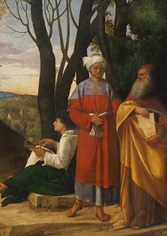 Image:Giorgione - “The Three Philosophers” (1508-1509), Kunsthistorisches Museum, Vienna)
Image:Giorgione - “The Three Philosophers” (1508-1509), Kunsthistorisches Museum, Vienna)The Arab pillar of European culture
January 14, 20197:00 p.m.MADRIDCasa Árabe Auditorium (at Calle Alcalá, 62). 7:00 p.m. Free entry until the event’s capacity is reached.In Spanish.First session in the series “Dialogues on Open Societies,” given by Josep Borrell, Spain’s Minister of Foreign Affairs, Susana Calvo Capilla, a professor from the Universidad Complutense de Madrid and Emilio González Ferrín, a professor from the University of Seville.The event will be presented by Pedro Martínez-Avial, the General Director of Casa Árabe.
The way European culture as we know it was made possible by a spirit of civilizational synthesis which, at the same time, has always accompanied emerging cultures. The term “Renaissance,” insofar as it means getting beyond an intended “Middle Age,” seems to propose an interpretation that restores some golden time past, Classical Antiquity, clearing away the fog of some “dark” intermediate era. However, more careful reflection on the cultural sources from Europe shows that this “Middle Age” was less transitional and obscure; closer to Orientalizing sources in which the role of Al-Andalus is highlighted, an atypical component of what historian Charles H. Haskins detected to be an earlier Renaissance in the twelfth century. A fair assessment of that legacy from Al-Andalus, as well as its transmission to the rest of Europe, places Spain and its cultural heritage at a privileged crossroads with connections linking Mediterranean and European cultures, and conveying them across to the other side of the Atlantic.
Conference information sheet
Josep Borrell Fontelles is the Spanish Minister of Foreign Affairs, the European Union and Cooperation. An aeronautical engineer who graduated from the Universidad Politécnica de Madrid, as well as earning a bachelor’s degree and PhD in Economics from the Universidad Complutense de Madrid and a Master’s degree in Applied Mathematics from Stanford University in California. From 1982-1996, he successively held the positions of Secretary General of the Budget (1982-1984), State State Secretary of Public Finance (1984-1991) and Minister of Public Works, Telecommunications, Transportation and the Environment (1991-1996). A member of the Spanish Parliament for Barcelona from 1986 to 2003, he was a member of the European Convention (1999-2002) which wrote the draft version of the European Constitution. Elected to be a member of the European Parliament in the election of 2004, in the first half of the legislature (2004-2009) he was the President of the European Parliament, and in the second half he was President of the Commission on Development Aid. From 2010 through 2012, he was the President of the European University Institute of Florence. He is currently the “Jean Monnet” chair at the Complutense Institute of International Studies.Susana Calvo Capilla is a professor of Art History at the Universidad Complutense de Madrid. In 2001, she presented her doctoral thesis on the religious architecture of Al-Andalus and has recently published her first monograph on The Mosques of Al-Andalus. She has completed research stays in Cairo, Paris and Damascus. Her main lines of research, which appear in many different publications and educational undertakings, focus on studying the art and culture of Al-Andalus within the context of Islam and Europe, with a special highlight on visual culture and its links with the Mediterranean, the endurance of classical Antiquity, the transformations that have occurred in the Christian era, women cultural patrons and epigraphic programs. She has taken part in several exhibitions and was the main researcher on the project “Al-Andalus, The Hispanic Kingdoms and Egypt: Art, power and knowledge in the medieval Mediterranean” (HAR2013-45578-R), financed by Spain’s Ministry of Science and Innovation, until 2018..Emilio González Ferrín is a professor of Islamology and Arab Studies at the University of Seville. Having earned a PhD in 1995 with a thesis on Euro-Arab dialogue, his profile as an educator and researcher attempts to get beyond Orientalism in its interpretation of Arab and Islamic historical events. In this sense, his works revolve around three different core points: starting out on the basis of cultures and comparative religion, he analyzes the cultural sources in the text of the Qur’an (1) and what is known as medieval historiology, above all the entry of Islamic culture into Europe through Al-Andalus (2), then establishing a coherence with the present time in Euro-Arab relations (3) and the Mediterranean in general. He has published numerous articles, ten monographs on topics involving cultural cooperation with the Arab world and Islam, and books. In June of 2008, he was given the “Scientific Work for General Audiences Award” by the University of Seville for his articles in the Spanish written press. -
Twenty-first century migrations and world governance
January 29, 20197:00 p.m.MADRIDCasa Árabe Auditorium (at Calle Alcalá, 62). 7:00 p.m. Free entry until the event’s capacity is reached.In Spanish.As a part of the series Dialogues on Open Societies, Casa Árabe and the Ministry of Foreign Affairs, the European Union and Cooperation have organized this conference on migration, to be given by three experts on the subject matter.The session will include speakers Carmen González, a tenured professor at the UNED and head researcher at the Real Instituto Elcano; Georgina Lara, who is responsible for topics of human trafficking at the International Organization for Migrations, and José Luis Pardo, Ambassador on a Special Mission for Migratory Affairs with the Ministry of Foreign Affairs, the European Union and Cooperation. Moderated by: Pedro Martínez-Avial, the General Director of Casa Árabe
Migration is a reality today on on a worldwide scale. People’s movements are increasing in number and the circumstances which they face on their journeys require a joint response by the entire international community.
We are currently seeing the greatest flow of migrants since World War Two, which is why international migration represents one of the crucial challenges being faced by society in the twenty-first century. New migration in a globalized world displays different features from the migration movements of the past. According to data from the International Organization for Migration (IOM), at least 30,500 people have lost their lives attempting to migrate irregularly, and out of these approximately 4,000 died or disappeared on migration routes over the last year of 2018 alone.
The way migration policies are designed and implemented must take into account complex factors such as multiculturality and co-existence in societies taking in migrants, as well as the protection of the human rights of the most vulnerable: irregular migrants. The series Dialogues on Open Societies, organized by Casa Árabe with the cooperation of the Ministry of Foreign Affairs, the European Union and Cooperation, will arouse debate about the contemporary problems affecting both shores of the Mediterranean.
Carmen González Enríquez is a head researcher at the Real Instituto Elcano, where she runs the areas of Public Opinion and Migrations. She is also a tenured professor in the Political Science Department at the UNED. She has been a visiting researcher at the Centre on Migration Policy and Society at Oxford University and at the Center for Political Studies in Budapest. In recent years, her research has led her to take part in several projects financed by the European Commission, including ITHACA (Integration, Transnational Mobility and Human, Social and Economic Capital Transfers), METOIKOS (Circular migration patterns in Southern and Central Eastern Europe: Challenges and opportunities for migrants and policy makers) and CLANDESTINO (Undocumented Migration: Counting the Uncountable).
Georgina Lara is a member of the International Organization for Migration with a bachelor’s degree in International Relations and a specialization in International Cooperation. She is responsible for the areas of Human Trafficking and Transsexuals at the IOM. She forms part of the PROTECT project, which focuses on protecting migrants from sexual and gender-related violence, as well as providing support to victims.
José Luis Pardo is a career diplomat who joined Spain’s diplomatic service in 1993. During his career, he has focused on three main fields: the Arab world and the Mediterranean (second in chief at the embassies in Libya, 1996-1999, and Jordan, 1999-2002, and the Advisor for the Barcelona Euromed Process, UPM, 2005-2007), the European Union (Advisor for Community Affairs at the Berlin embassy from 2002 through 2005, and Assistant Director General for Foreign Activity and EU Trade Affairs, from 2007 through 2014), as well as focusing globally on migration. In 2014, he was named Ambassador of Spain in Niger, and since 2017 he has been the Ambassador on the Special Special Mission for Migratory Affairs.
Photo: UK Department for International Development photostream
-
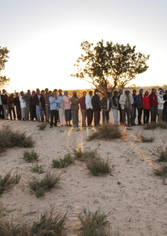 Refugees from Libya Queue for Food at Tunisia Transit Camp UUnited Nations Photo)
Refugees from Libya Queue for Food at Tunisia Transit Camp UUnited Nations Photo)Migrations in the Arab world
February 12, 20197:00 p.m.MADRIDCasa Árabe Auditorium (at Calle Alcalá, 62). 7:00 p.m. Free entry until the event’s capacity is reached.In English, with simultaneous translation into Spanish.On Tuesday, February 12, we will be holding the third session of the series “Dialogues on Open Societies,” organized with the cooperation of the European Council for Foreign Relations (ECFR).The conference will be given by Tasnim Abderrahim, a visiting member of the ECFR’s Middle East and North Africa program, and Tarek Megerisi, an ECFR researcher on Libya. Presented by Karim Hauser, Casa Árabe’s Coordinator of International Relations.
In recent decades, migratory movements through the Mediterranean have filled the political agenda and captured the attention of the media, forcing European countries to debate over how to respond to this challenge. But how is this seen from the other shore of the Mediterranean?At this conference, two experts on politics in the region will discuss how the governments of North Africa view European proposals on migration, which range from creating long-term disembarkation platforms to adopting security measures intended to block migrant flows towards Europe. Similarly, they will examine whether closing off the Libyan route has simply deviated migration flows towards other countries in the region, and how North African priorities may give rise to new agreements with Europe.
The series ”Dialogues on Open Societies” is an initiative of Spain’s Ministry of Foreign Affairs, the European Union and Cooperation, with the cooperation of Casa Árabe.
Tasnim Abderrahim
Abderrahim is a visiting member of the ECFR’s Middle East and North Africa Program, where she focuses on the topic of migration within the framework of EU-North Africa relations. Prior to that, she worked at the European Center for Development Policy Management (ECDPM) in Maastricht, and as a research assistant at the Centre des Etudes Méditerranéennes et Internationales (CEMI) in Tunisia. Her fields of research include migration, decentralization and local governance, as well as Tunisia’s foreign relations. She is the co-editor of Tunisia’s International Relations Since the “Arab Spring”: Internal and external transition, a book which examines the changes in Tunisia’s foreign policy and bilateral relations before and after 2011.
Tarek Megerisi is a political analyst and researcher with the ECFR who specializes in Libyan affairs and, in general, governance and development in the Arab world. He began his career in Tripoli at the Sadeq Institute and several international NGOs which perform research and give assistance for democratization to Libya’s post-revolutionary authorities, from 2012 to 2014. In 2014, he returned to London, where he has been working as an analyst and researcher. He consulted on Libya’s policy on a series of international missions in the country and has contributed to several issues of the publicationForeign Policy about current events in Libya. He has also authored articles for organizations such as WPF and the Legatum Institute, and he has contributed to broader publications for journals such as ISPI.
-
The good neighbor policy with the Mediterranean
February 21, 20197:00 p.m.MADRIDCasa Árabe Auditorium (at Calle Alcalá, 62). 7:00 p.m. Free entry until the event’s capacity is reached.In English, with simultaneous translation into Spanish.The Secretary General of the Union for the Mediterranean, Nasser Kamel, is taking part in another session of the series Dialogues on Open Societies. It will be taking place in Madrid on Thursday, February 21.Nasser Kamel will be taking part in a conversation with Senén Florensa, Spain’s Ambassador/Permanent Representative to the United Nations Office and other International Bodies in Vienna. The event will be presented by Pedro Martínez-Avial, the General Director of Casa Árabe.
Regional cooperation and dialogue form the foundation for dealing with the major challenges faced in the Mediterranean Basin from the perspective of stability, human safety, the environment and a reactivation of the economy. The Union for the Mediterranean, with its twenty-eight EU members and fifteen countries from the southern shores, as a direct heir to the Barcelona Process (1995), is in a unique position to seek opportunities and strengthen the good neighbor and integration policy. The role of women in society, transportation, energy, industry, the environment and employment are just parts of the common agendas to be analyzed by the Secretary General of the Union for the Mediterranean, Nasser Kamel, in his talk with Ambassador Senén Florensa, Chairman of the Delegate Commission of the European Institute of the Mediterranean (IEMed).The series Dialogues on Open Societies is an initiative of Spain’s Ministry of Foreign Affairs, the European Union and Cooperation, with the cooperation of Casa Árabe.
Nasser Kamel is the Secretary General of the Union for the Mediterranean. A career diplomat of the Egyptian government, he held the position of Ambassador of Egypt in the United Kingdom from 2014 to 2018, and was the Ambassador to France from 2006 to 2012, during which time he took part in the drafting of the Paris Summit Declaration of 2008, which marked the launching of the Union for the Mediterranean. From 2004 through 2006, he was the director of Egypt’s Public Information Service. Before holding that position, he worked at various embassies, including those in Washington (1984-1988), Lisbon (1990-1994), Tunis (1994-1998), Brussels (1999-2001) and Paris (2001-2004). Kamel studied Political Science at the University of Brussels and at the University of Cairo’s School of Economic and Political Science.
Senén Florensa is currently Spain’s Ambassador/Permanent Representative to the Office of the United Nations and other International Bodies in Vienna. He was Spain’s Consul General in Rome from 2017 to 2018 and Spain’s Ambassador to Tunisia from 2000 to 2004. He was the Director General and later Executive President of the European Institute of the (IEMed) from 2006 through 2017. He is the director of the journal afkar/ideas and of the Mediterranean Yearbook published by IEMed. He was the president of the World Congress of Middle East and North Africa Studies (WOCMES) in 2010, the Secretary of International and European Affairs of the Autonomous Regional Government of Catalonia and a member of the Organizing Committee of the Barcelona Olympic Games in 1992.
-
 Photo: Alla Gill (CC)
Photo: Alla Gill (CC)Towards a European migration policy
March 12, 20197:00 p.m.MADRIDCasa Árabe Auditorium (at Calle Alcalá, 62). 7:00 p.m. Free entry until the event’s capacity is reached.In Spanish.We continue with the series of “Dialogues on Open Societies” with this conference, given by Sami Naïr and Nicolás Berlanga.Sami Naïr, a professor of Political Science and the director of the Institute of Studies for Mediterranean and Atlantic Cooperation, and Nicolás Berlanga, Migrations Advisor for the Africa Department at the European External Action Service, will be presented by Pedro Martínez-Avial, the General Director of Casa Árabe.
The phenomenon of migration is complex and has many facets, which means the answers given cannot be simplistic. There must be more to matters than just opening and closing borders. What responsibilities are held by issuing, transit and destination countries? In what ways can migration and development be integrated so that these three factors may be beneficial in terms of migratory flows?
Within the European space, it is advisable to highlight that there is a division of powers between the EU and the Member States on migration. Likewise, in recent years, episodes of inaction and inflexibility among certain Member States have been alternated with showings of solidarity seen among towns and city halls. Within this context, it is important to insist upon the humanitarian factor and dialogue amongst all of the parties concerned, which may contribute to a re-examination of the vertical North-South relationship.
Sami Naïr is a political scientist, philosopher, sociologist and professor who specializes in migratory movements who created the concept of “co-development.” He is the director of the Institute of Studies for Mediterranean and Atlantic Cooperation (IECMA). He was an MP in the European Parliament for the French Socialists (1999-2004), a time period in which he was a full member of the Foreign Affairs Committee for Persons’ Rights, Common Security and Defense Policy. Amongst his positions in academia, he has also been the director of the Centro Mediterráneo Andalusí at Pablo de Olavide University in Seville.
Nicolás Berlanga is the main advisor on migrations in the Africa Department at the European External Action Service. He has been a European European Union ambassador to Togo (2013-2017), the Main Advisor for the European Union Delegation in Cameroon and the chargé d’affaires for the European Commission Delegation in Vanuatu. From 1992 to 2000, he worked with the NGOs Action Against Hunger and Doctors Without Borders in countries like Kenya, Somalia, Armenia and Nicaragua. He was also a United Nations observer in Angola and Haiti from 1990-1991. Since 2002, he has been a civil servant in foreign relations for the European Union.
-
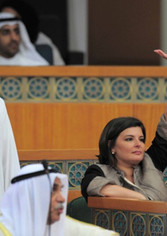
Feminisms, religion and secularism
March 26, 20197:00 p.m.MADRIDCasa Árabe Auditorium (at Calle Alcalá, 62). 7:00 p.m. Free entry until the event’s capacity is reached.In Spanish and English, with simultaneoous translation.On Tuesday, March 26, there will be a new session in our series titled “Dialogues on Open Societies,” given by journalist and writer Mona Eltahawy, along with fellow writer Najat el Hachmi.Presented by Karim Hauser, Casa Árabe’s Coordinator of International Relations.
Reports from different international entities coincide in ranking the countries of North Africa and the Middle East amongst the worst in terms of gender equality. Though the situation differs by country, and in certain cases the Law has moved ahead considerably in guaranteeing rights on paper, the unrest which began in 2011 has not achieved the inclusion of women in public life under conditions of equality with men, and many consider themselves second-class citizens. Perhaps Tunisia could be named as a unique case where the triumph of protests has led to an improvement in women’s status.Through their activism, many Arab feminists question the oppressive mix of politics, cultural habits and religion which permeates every layer of society, and they continue fighting to make their voices heard, both inside and outside the region. Mona Eltahawy, who authored Headscarves and Hymens, and Najat el Hachmi, the author of The Last Patriarch, will be meeting at Casa Árabe to discuss this problem and call out to demand gender equality. The event will include the participation of the publishing firm Capitán Swing and the Barcelona Contemporary Culture Center (Centre de Cultura Contemporània de Barcelona, CCCB).Mona Eltahawy is a columnist and international analyst of the subjects of Arabs, Muslims and feminism. She was a correspondent for Reuters in the Middle East for six years and has worked for the media in several countries in the region, and in China. She is currently collaborating with media such as the New York Times and The Guardian. She is a member of the Communications Consulting Group Musawah, the movement for justice and equality in the Muslim family. She has received a wide range of awards and acknowledgments for her work as a journalist, and Time magazine named her a “person of the year” along with other activists from around the world. She is the author of the book Headscarves and Hymens: Why the world needs a sexual revolution.Najat el Hachmi was born in Morocco after her father had already emigrated to Catalonia. At the age of eight, she moved to the town of Vic. She earned her undergraduate degree in Arabic Philology from the University of Barcelona. She has been writing since she was eleven years old, in the beginning as a form of entertainment, but little by little writing grew into a way for her to channel her thoughts about feeling like she was from two places at once, and a way to bring these two worlds to which she belongs closer together. In 2004, her book Jo també sóc catalana (I Am Catalan, Too) was published. She appears as a guest speaker on the radio and has articles published in the written press. Her work The Last Patriarch was bestowed with the Ramon Llull Award of 2008 and the Ulysse Award for a first novel in 2009, and she was a finalist for the Prix Meditérranée Étranger in 2009.
The series “Dialogues on Open Societies” is an initiative of Spain’s Ministry of Foreign Affairs, the European Union and Cooperation with the cooperation of Casa Árabe, co-directed by Doménec Ruiz Devesa, Advisor for the Cabinet of the Ministry of Foreign Affairs, the European Union and Cooperation, and by Pedro Martínez-Avial, the General Director of Casa Árabe.
-
Arab-Muslim diasporas in Spain, Europe and the Americas
April 09, 20197:00 p.m.MADRIDCasa Árabe Auditorium (at Calle Alcalá, 62). 7:00 p.m. Free entry until the event’s capacity is reached.In Spanish.New conference in the series “Dialogues on Open Societies,” given by photographer Carole Alfarah, along with writer, journalist and sociologist Leyla Bartet, and Universidad Complutense de Madrid professor and researcher Mohammed Dahiri.Presenting the event is Karim Hauser, Casa Árabe’s Coordinator of International Relations.
The Arab diaspora consists of the descendants of Arab immigrants who, either voluntarily or as refugees, emigrated from their native lands to non-Arab countries, mainly in South America, Europe, North America and the Caribbean, as well as parts of Asia and West Africa. In the Americas, the majority are descendants of the waves of migration out of Lebanon, Syria and Palestine during times of the Ottoman Empire, whereas in Europe they are more related with processes of decolonization in the Maghreb region as of the second half of the twentieth century. More recently. the crises in Iraq and Syria have led to new incomers who are reshaping identities and expectations in the societies which take them in. Carole Alfarah, Leyla Bartet and Mohammed Dahiri will be analyzing the different characteristics and contributions of these diasporas.
Carole Alfarah is an independent Syrian photographer. Since 2009, she has documented topics related with marginalized peoples, youths, child labor and the working mothers in her country. From 2009-2010, she completed a year of training in photojournalism at the World Press Photo Foundation. In 2012, she was forced to leave Syria as a result of the conflict there. From that year until 2015, she worked on the project My beloved broken home about the marks left behind by the war in her country. She has received prizes such as the Arab Media Award on Child Rights given by Unicef.
Leyla Bartet is a writer, journalist and sociologist who graduated from the Institut d’Etudes du Développement Economique et Social (IEDES Univ. De Paris 1). Until July of 2016, she held the position of Civilian Attaché at UNESCO’s Permanent Representative’s Office in Peru, and she has performed a wide range of consulting work for that organization. She has also been a guest conference speaker at the French universities of Caen, Amiens, Paris and Poitiers. She has had several books and essays published about Arab immigration to South America. Her latest book, Miradas Cruzadas. Seis ensayos sobre las relaciones interculturales entre América del Sur y los Países Árabes (Crossing Glances: Six essays on intercultural relations between South America and the Arab Countries), was just published by Editorial Académica Española. She writes for the Peruvian magazines Qué hacer and Perú Hoy.
Mohammed Dahiri is a professor in the Department of Arab and Islamic Studies at the Universidad Complutense de Madrid, with a PhD in that field from the Universidad Hispalense in Seville. His main lines of research include international migrations in the Euro-Mediterranean space, interculturalism and diversity management. He has authored, co-authored and edited a wide range of research working, including: North Africa and the process of change: political, legal, social and economic transformations (Université Paris VIII, 2015); Civil society and transitions in North Africa: Egypt-Algeria-Tunisia-Morocco (Icaria, 2013) and Moroccan Residents Abroad: An economic bridge between countries of residence and Morocco (Diwan, 2012).
-
Islam and democracy
April 25, 20197:00 p.m.MADRIDCasa Árabe Auditorium (at Calle Alcalá, 62). 7:00 p.m. Free entry until the event’s capacity is reached.In Spanish and French, with simultaneous translation.On Thursday, April 25, another session in the series “Dialogues on Open Societies” is coming to Casa Árabe. The main speakers will be Professors Latifa Lakhdhar and Waleed Saleh.Latifa Lakhdhar, a professor of Contemporary History at the University of Tunisia’s School of Humanities and Social Sciences, and Waleed Saleh, a professor of Arab and Islamic Studies at the Universidad Autónoma de Madrid, will be introduced by Pedro Martínez-Avial, the General Director of Casa Árabe.
According to scholar Asef Bayat, the commonly repeated question of whether Islam is compatible with democracy must be examined on the basis of Muslims’ intellectual convictions and political capabilities, rather than focusing on it through the “essence” of Islam. It is individuals, groups and movements that define the makeup of the political world, and not holy scriptures. Therefore, attempting to clarify the relationship between Islam and democracy requires an analysis of social movements and their historical context in order to seek out the proper nuances at the heart of the matter. It is more appropriate to ask under what conditions Muslims can make Islam and democracy most compatible (assuming that the term democracy is devoid of ambiguity). It is precisely breaking away with the idea that all Muslims are the same, static and monolithic, which makes up one of the ideas clearly established by Edward Said in his work Orientalism. The ways in which hegemonic social role-players interpret their moral obligations and determine more authoritarian or inclusive political outcomes are not all the same either. With one corollary: political Islam is also diverse. For instance, the Iranian revolution of 1979 cannot be compared with the uprise of the Muslim Brotherhood in Egypt, or the existence of Ennahda in Tunisia with that of the AKP in Turkey.
Latifa Lakhdhar is a professor of Contemporary History at the University of Tunisia’s School of Humanities and Social Sciences. Her many varied works revolve around Islamic religious history and the history of women with regard to religious heritage. An activist in the leftist democratic movement since the late 1970s, and in particular the Communist Party of Tunisia, she was a founder of the Tunisian Association of Democratic Women and a member of the Tunisian Association of Research for Development. In 2011, she became the Vice-President of the “High Instance for Political Reform, the Democratic Transition and the Achievement of the Objectives of the Revolution.” In 2015, she became the Minister of Culture and Heritage.
Waleed Saleh is a professor of Arab and Islamic Studies at the Universidad Autónoma de Madrid. With a bachelor’s degrees in Arabic Philology from the University of Baghdad and in Hispanic Philology from the University of Valencia, and a PhD in Arab and Islamic Studies from the Universidad Autónoma de Madrid, Saleh has worked as a professor at several centers of learning in Iraq and Morocco. He authored the book “El ala radical del islam. El islam político: realidad y ficción (“The Radical Wing of Islam. Political Islam: reality and fiction,” 2007) and “Irak: invasión, ocupación y caos” (“Iraq: Invasion, occupation and chaos,” 2005), as well as others.
-
Liberal currents in Islam
May 07, 20197:00 p.m.MADRIDCasa Árabe Auditorium (at Calle Alcalá, 62). 7:00 p.m. Free entry until the event’s capacity is reached.In Spanish and French, with simultaneous translation.On Tuesday, May 7, we will be holding another session in the series “Dialogues on Open Societies,” this time given by Islamologist Rachid Benzine and Professor Luz Gómez.Islam, like any other religion, has followers who follow many different currents and interpretations. In the West’s collective imaginary, the most dominant among them seem to be those which are highly conservative and fundamentalist, and they have gained strength in recent decades due to the support give by certain Gulf countries. However, these voices are not the only ones in existence, or even the most dominant, among the 1.3 billion Muslims in the world.
Islamologists like Rachid Benzine defend a critical/historical perspective as a way to approach the Qur’an, to take a step back when examining the sacred text and allow for interpretations which take its historical context into account. At this conference, Rachid Benzine and Luz Gómez will be analyzing liberal currents in Islam which provide alternatives to ahistorical, literalist interpretations that stir up religious fanaticism.
Rachid Benzine is an Islamologist who specializes in Qur’anic hermeneutics and a notable figure in liberal Islam in the French-speaking world. He is an associate researcher at the Paul Ricoeur Fund and has been a professor at the Institute of Political Studies in Aix-en-Provence. Some of his most notable publications include Les Nouveaux Penseurs de l’islam (The New Thinkers of Islam, 2004 and 2008), Le Coran expliqué aux jeunes (The Qur’an Explained to Youths, 2016) and, with Christian Delorme, Nous avons tant de choses à nous dire. Pour un vrai dialogue entre chrétiens et musulmans (We Have So Much to Say to Each Other: For true dialogue between Christians and Muslims, 2018) and La République, l’Église et l’islam (The Republic, the Church and Islam, 2016). He has written a book with liberal rabbi Delphine Horvilleur, Des mille et une façons d’être juif ou musulman (On the 1001 Ways to Be Jewish or Muslim, 2017). He has also published an epistolary novel and adapted it for theater, titled Lettres à Nour (Letters to Nour, 2016).
Luz Gómez is an associate professor of Arab and Islamic Studies at the Universidad Autónoma de Madrid. A specialist on contemporary Arab ideologies, she has had the following books published: Diccionario de islam e islamismo (Dictionary of Islam and Islamism, 2019), Entre la sharía y la yihad. Una historia intelectual del islamismo (Between Shari’a and Jihad:An intellectual history of Islamism, 2018) and Marxismo, islam e islamismo: El proyecto de Adil Husayn (Marxism, Islam and Islamism: The project by Adil Husayn, 1996). In 2012, she was awarded the National Translation Prize for her version of In the Presence of Absence, by Palestinian poet Mahmoud Darwish. She is also a contributing writer for the Spanish daily newspaper El País.
-
The geopolitics of conflict and cooperation in the Mediterranean
May 21, 20197:00 p.m.MADRIDCasa Árabe Auditorium (at Calle Alcalá, 62). 7:00 p.m. Free entry until the event’s capacity is reached.In English and Spanish, with simultaneous translation.On Tuesday, May 21, we are holding a new session in our event series titled “Dialogues on Open Societies” in Madrid, with this conference.Taking part are Gerald Knaus, founder of the European Stability Initiative, and Kristina Kausch, a senior researcher for the German Marshall Fund. Moderated by: Eduard Soler i Lecha, a senior researcher at the CIDOB.
The rivalries between regional powers have been shifting and changing since the 2011 uprisings. Alliances are becoming increasingly volatile and inconsistent, in terms of both state and non-state role-players. In order to understand the way these conflicts are being redefined, as well as seeking out paths for cooperation in the Mediterranean, it is essential that we examine internal, regional and global dynamics. This analysis will take a look at a few specific cases and the way in which the EU has reacted to crises, above all in fields like migration and security. Similarly, there will be a discussion of United States’ role in the region and the way in which geopolitical borders have grown blurrier, involving neighboring regions like the Sahel, the Horn of Africa and the Balkans, as well.
Conference information sheet
Gerald Knaus is the founder of the European Stability Initiative, a think-tank with offices in Berlin, Brussels and Vienna, which does work on southeastern Europe, the Caucuses, European expansion the future of the EU. Kraus studied at the Universities of Oxford, Brussels and Bologna, and has taught Economics at the University of Chernivtsi in Ukraine, as well as working for five years at NGOs and international entities in Bulgaria and Bosnia-Herzegovina. From 2001 to 2004, he worked at the UN Mission in Kosovo. He was a founding member of the European Council on Foreign Relations (ECFR) and is a specialist on state-building processes and intervention.
Kristina Kausch joined the German Marshall Fund in Brussels in 2016. Ms. Kausch’s research focuses on Europe’s political relations with the Middle East and North Africa, political transformations in the Arab world and geopolitical trends in the Middle East. Prior to that, she worked at the Carnegie Endowment for International Peace, directed the Middle East Program at FRIDE, and was an expert at the German cooperation agency GIZ. She has had three books published on the region, as well as articles in both academic journals and the written press (The Guardian, El País, Middle East Eye and Süddeutsche Zeitung).
Eduard Soler i Lecha is a senior researcher at CIDOB and the scientific coordinator of MENARA, a European project on geopolitical changes in the Middle East and North Africa. He is a political scientist and has a PhD in International Relations from the Universitat Autònoma de Barcelona. His fields of work include: Euro-Mediterranean relations, Turkey’s foreign and domestic policy, political change in North Africa and the Middle East, Spain’s Mediterranean policy and cooperation in the field of security in the Mediterranean.
-
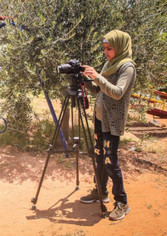 Photo: Hamdy Jouini, Tunisia
Photo: Hamdy Jouini, TunisiaCulture as a tool for change: avant-garde cultural movements in the Arab world
June 04, 20197:00 p.m.MADRIDCasa Árabe Auditorium (at Calle Alcalá, 62). 7:00 p.m. Free entry until the event’s capacity is reached.In Spanish and English, with simultaneoous translation.On Tuesday, June 4, we are holding a new session in our event series titled “Dialogues on Open Societies” in Madrid.Participating in the event will be Basma El Husseiny, director of the organization Action for Hope, and Ignacio Gutierrez de Terán, a researching professor at the Universidad Autónoma de Madrid. Moderated by: Nuria Medina, Casa Árabe’s Culture Coordinator.
The year of 2011 was a turning point in many Arab countries, because it saw the popular expression of a will to change. Culture and artistic creation are tools which allow for the empowerment of people and socio-economic improvement, and they can make social change easier in the medium and long term. Music, literature, theater and the audiovisual or plastic arts can be helpful in promoting significant change among artists and civil society, as well as meeting the psychological needs of those displaced by conflicts.
Conference information sheet
Basma El Husseiny is an art management specialist and cultural activist who currently runs the organization Action for Hope, headquartered in Beirut. She has taken part in supporting independent cultural projects and organizations in the Arab region throughout the last two decades. She is a UNESCO expert on cultural governance and prior to that was responsible for the Media, Art and Culture Program of the Ford Foundation in the Middle East and North Africa, as well as the Arts Director of the British Council in Egypt. She is also Egypt’s representative in the Arterial Network, the largest cultural network in Africa. Until September of 2014, she worked as a founder and managing director of Al Mawred Al Thaqafy, a regional non-profit organization which supports young artists and writers, while stimulating cultural exchanges inside the Arab region and with the world.
Ignacio Gutiérrez de Terán is a professor with the Department of Arab and Islamic Studies and Eastern Studies at the Universidad Autónoma de Madrid. As a researcher, he has focused on studying the identities of group, faith, region and socio-political factors among the communities in the Middle East, the Maghreb region and the Horn of Africa. He has also dealt with aspects related to so-called “political Islam,” above all in Syria, Lebanon and Somalia. At the same time, he has had translations, articles and books published about Arab erotica books, especially Al-Tifashi’s “Delight of Hearts,” The Perfumed Garden” (in collaboration with Naomí Ramírez Díaz) and “Praise and diatribe of courtesans and ephebes,” by Al-Jahiz (with Pedro Buendía).
-
Arab regional integration
June 20, 20197:30 p.m.MADRIDCasa Árabe Ambassadors’ Hall (at Calle Alcalá, 62, First Floor). 7:30 p.m. Free entry until the event’s capacity is reached.In Spanish.On Thursday, June 20, we have organized another session in the series titled “Dialogue on Open Societies,” this time given by Bichara Khader, professor emeritus at the Université catholique de Louvain in Brussels.Taking part along with him is Martín Ortega Carcelén, a professor of International Law and International Relations at the Universidad Complutense de Madrid. Presented by: Karim Hauser, Casa Árabe’s Coordinator of International Relations.
The Arab League was founded in 1945, with the objective or promoting better coordination among the policies of Arab countries, as well as seeking their economic integration. The idea of a regional economic block arose in 1953. In 1958, the Arab Economic Unity Council was created, and in 1964, the Arab Common Market. Later, stagnation in the project gave rise to the creation of new regional organizations, such as the Gulf Cooperation Council (GCC) in 1981 and the Arab Maghreb Union (UMA) in 1989. Conflicts between states like that existing between Morocco and Algeria complicated the UMA’s success, unlike the GCC, which, until the deterioration of relations between Qatar and Saudi Arabia, had been the epitome of successful regional integration. Given the reconfiguration of strategic alliances in the region, it is a good time to reflect upon the future of
regional Arab integration.
Conference information sheet
Bichara Khader is a professor emeritus of the Université catholique de Louvain in Brussels and the founder of the Center for Studies and Research on the Contemporary Arab World. A specialist on the Arab world of Palestinian origin, he has been a member of the Group of Top Experts on Foreign Policy and Common European Security (European Commission) and a member of the Group of Experts for Cultural Dialogue in the Mediterranean (European Presidency). His works have dealt with a wide range of topics, including everything from the Palestinian conflict to the status of Muslims in in Europe, discussing topics such as Islamophobia.
Martín Ortega Carcelén is a professor of International Law and International Relations at the Universidad Complutense de Madrid. He was formerly the director of the Cabinet for Analysis and Prevision at the Spanish Ministry of Foreign Affairs and Cooperation, and was also a head researcher at the European Union’s Institute for Security Studies in Paris. He collaborates with IE University and the Deusto Business School and contributes opinion and commentary articles to the newspaper El País, as well as appearing on the Canal 24 network broadcast by RTVE. He was the director of the INCIPE and has completed research stays at the Max Planck Institute for International Law in Heidelberg.
-
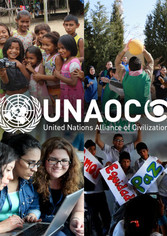 Photo: UNAOC
Photo: UNAOCThe New Emerging Challenge of the Twenty-first Century: One humanity, many cultures
July 08, 20197:00 p.m.MADRIDCasa Árabe Auditorium (at Calle Alcalá, 62). 7:00 p.m. Free entry until the event’s capacity is reached.In Spanish, with simultaneous translation into English.The United Nations’ High Representative for the Alliance of Civilizations, Miguel Ángel Moratinos, will be giving this conference on Monday, July 8 at the Casa Árabe headquarters in Madrid. It will be the last session in our event series “Dialogues on Open Societies.”Moratinos, the United Nations’ High Representative for the Alliance of Civilizations, will be introduced by Pedro Martínez-Avial, the General Director of Casa Árabe, and Domènec Ruiz-Devesa, a Member of the European Parliament.More than ever, diversity has become a reality that enriches human life. Pluralism in nations and cities, ethnicities and identities, beliefs and traditions, forms the spectacular mosaic of humankind. In the midst of an increase in culture-based conflicts, radicalization and xenophobia, we must acknowledge that there is a plural set of civilizations which must co-exist in peaceful, inclusive societies. This is Objective 16 within Agenda 2030 for Sustainable Development and is the raison d’être of the United Nations Alliance of Civilizations (UNAOC) which, created by Kofi Annan in 2005 and co-sponsored by Spain and Turkey, embraces and promotes the values of tolerance and respect for others.
Conference information sheet
Miguel Ángel Moratinos has been the United Nations’ High Representative of the Alliance of Civilizations (UNAOC), with the rank of an Undersecretary General, since January 2019, He has devoted his professional and political career to international relations and development cooperation, above all as Spain’s Minister of Foreign Affairs and Cooperation from 2004 through 2010. As of 1987 and in 2004, he held the position of Assistant Director General for North Africa (1987-1991), Director of the Institute of Cooperation with the Arab World (1991-1993), Director General of Foreign Policy for Africa and the Middle East (1993-1996), Ambassador of Spain in Israel (1996) and Special Representative to the EU for the peace process in the Middle East (1996-2003). As the head of Spain’s diplomatic corps, he presided over the UN Security Council in the year of 2004, holding the acting presidencies of the Organization for Security and Cooperation in Europe (OSCE), the Council of Europe and the European Union Council.


